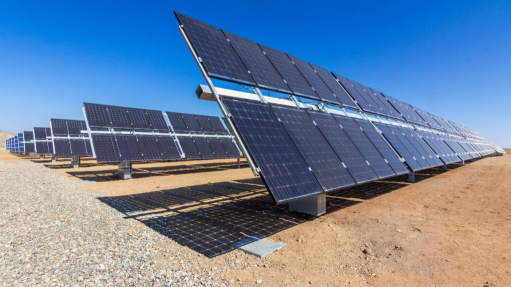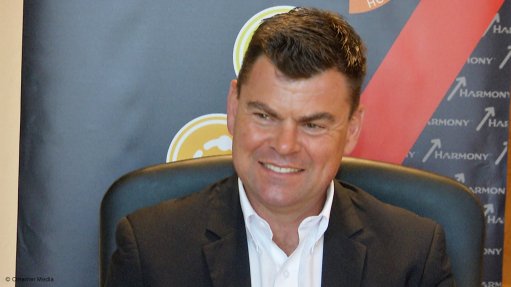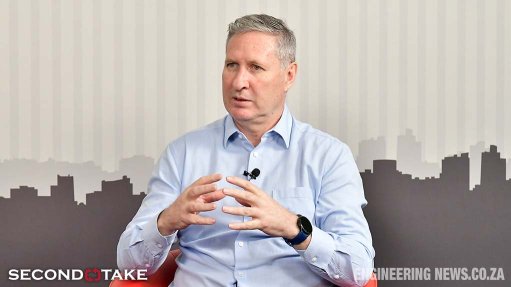Energy efficiency part of net-zero journey, but investments, renewable energy needed for broad impact
Energy efficiency is an important component in reaching net-zero greenhouse-gas (GHG) emissions, lifting people out of energy poverty and enabling development, but requires public and private investment to secure these benefits, as well as growing development and use of renewable energy sources, speakers said during the African Energy Indaba 'Role of Energy Efficiency in Achieving Net Zero' panel discussion on March 2.
Renewable energy engineering, procurement and construction company Turnkey Solar Solutions CEO Maurits Perold said various case studies, and the company's own experiences in implementing projects, showed that phased energy efficiency initiatives contributed to offsetting about 7% to 10% of total energy costs.
"The best business case for commercial and industrial organisations typically starts with energy efficiency on one side and the introduction of own-generated power on the other side. When these companies try to leverage as much of their own generation for their baseload energy requirements as possible, that is where they can then determine how best to strive for net zero and secure the greatest commercial benefits.
"Different sectors and industries need different mixes and types of incentives aligned with the operating environment within these sectors, and incentives and policies must be tailor-made for each sector to best support energy efficiency and reduce emissions," he advises.
The European Union had an ambitious goal of decreasing GHG emissions by 55% by 2030, and energy efficiency was considered a precondition for such a large decarbonisation drive because, without energy efficiency, every action was more costly and, therefore, for every country and person to benefit, substantial actions in terms of energy efficiency was necessary, said European Commission energy directorate-general energy efficiency unit head Claudia Canevari.
Business advisory and consultancy EY Cova partner Tumelo Chipfupa added that energy efficiency was typically the cheapest way to reduce GHG emissions, with the additional benefit of avoiding surplus capital investment in new generation capacity.
"Energy efficiency reduces the cost of production and improves the competitiveness of companies, as well as improving the financial standing of households."
However, Perold highlighted that large companies, even after introducing energy efficiency into their organisations, still only achieved a small percentage of low- or zero-carbon offset of the total energy needs for the production capacity of their facilities, and energy efficiency was most effective when used alongside renewable energy.
Southern African Development Community Centre for Renewable Energy energy efficiency expert Mzwandile Thwala noted that energy efficiency, especially in the context of Southern Africa, was a viable option to contribute to net-zero goals, but only to a limited extent.
"Countries, sectors, industries, companies and consumers understand what role energy efficiency plays in reducing energy demand before they can leverage it as a concept to contribute to net-zero goals. They have to understand what the value is for them to participate in energy efficiency initiatives," he said.
Therefore, each sector requires different incentive packages and policy frameworks that fit their needs and circumstances to achieve the goal of furthering net-zero, he stated.
Countries need to set up appropriate regulations and standardisation, measurement and verification policies, strategies and legal frameworks, as well as compliance programmes, to achieve the multiple goals of energy efficiency initiatives.
"Linked to this, there is also a need to attract and create an enabling environment for private sector investment in renewable energy and energy efficiency projects," Thwala added.
After the start of the energy crisis and load-shedding in South Africa in 2007 and 2008, many companies introduced energy efficient solutions, but, once they had done this and achieved a given amount of energy saving, the only option left to reduce their electricity costs and associated emissions was to invest in renewable energy, said Perold.
"However, after the start of the power crisis, [State-owned power utility] Eskom introduced the first rebates for renewable energy projects, and many companies used this grant as a catalyst. This was followed by the Department of Trade and Industry Manufacturing Competitiveness Enhancement Programme, as well as South African Revenue Service incentives in the forms of Tax Act sections 12L and 12B tax and accelerate asset depreciation allowances.
"These multiple incentives can be, and have been, grouped together to make energy efficiency and renewable energy projects more lucrative, with up to 28% of the value of the projects that can be offset through their use. This is a significant driver of such investments," he said.
Further, the average return on investment horizon for renewable energy projects had tracked lower since 2008, from seven years to three years, owing to the lower levelised costs of the projects and the increases in Eskom tariffs. These served as significant drivers and were the type of incentives required to support broad uptake, said Perold.
Europe, Africa and the world needed to grow and continue to develop while using less energy. It is important for policies and awareness campaigns to ensure that energy efficiency is not perceived as a constraining factor that limits the capacity of consumers, whether households, commercial or industrial organisations, to continue with their activities, noted Canevari.
"It is also important to understand the links between energy efficiency and renewable energy, as they go hand-in-hand. We need to use less energy to perform the same functions, and increasingly energy should be produced by renewable sources. The two reinforce each other to ensure comparatively lower energy demand and lower price increases while providing the necessary energy for growth and development," she said.
Energy efficiency was not only a precondition to achieve the decarbonisation of economies, but was also the most cost-effective way of achieving this. Energy not consumed costs nothing, she highlighted.
"However, the challenge is that, often, energy efficiency requires investment before benefits are secured and these can present a problem for public and private investors, as well as a hurdle for industries and consumers. It is essential that policies push for the uptake of energy efficiency projects, but public financing is insufficient to bring about the desired changes to drive uptake.
"Therefore, it is essential that the private financing sector be encouraged and provided with instruments to finance energy efficiency projects and allow for their uptake. It is important that there is cooperation between private and public sectors to ensure energy efficiency delivers cost-effective benefits to society," Canevari averred.
Financing was one of the biggest obstacles to consumers, including households, commercial companies, building owners and industries to implement energy efficiency, said Chipfupa.
"Lots of companies have limited capital, especially following the impact of the [Covid-19] pandemic on their balance sheets. However, key to achieving this is to get consumers and financiers to realise the benefits of energy efficiency, especially in terms of improving their bottom lines," he noted.
Therefore, there needed to be an increase in funding for such projects from donors, governments, development finance institutions and private financing organisations, as they required investment before consumers could realise savings and benefits from energy efficiency, he added.
Simultaneously, investment support in the form of incentives, grants and, increasingly, the ability to reduce carbon taxes all contributed to lowering the total capital expenditure required to implement energy efficiency and renewable energy projects, said Perold.
"The lower the investment barriers, the more likely industry is to invest and carry out energy efficiency and renewable energy projects. Carbon offset can be an additional catalyst to unlock a larger market and drive investment in such projects," he said.
Further, a skills gap remains present in Southern Africa to implement energy efficiency projects, as well as to develop energy efficient technologies and equipment, stated Thwala.
"For example, building energy management systems have proven successful in many European countries. It is therefore important to promote adoption through public awareness, advocacy and the strengthening of regulations to highlight and address this skills component of energy efficiency.
"Southern African countries must develop clear energy efficiency strategies and targets that show how they intend to achieve the goals set out and, importantly, clearly define these according to sectoral needs and circumstances," he said.
Comments
Press Office
Announcements
What's On
Subscribe to improve your user experience...
Option 1 (equivalent of R125 a month):
Receive a weekly copy of Creamer Media's Engineering News & Mining Weekly magazine
(print copy for those in South Africa and e-magazine for those outside of South Africa)
Receive daily email newsletters
Access to full search results
Access archive of magazine back copies
Access to Projects in Progress
Access to ONE Research Report of your choice in PDF format
Option 2 (equivalent of R375 a month):
All benefits from Option 1
PLUS
Access to Creamer Media's Research Channel Africa for ALL Research Reports, in PDF format, on various industrial and mining sectors
including Electricity; Water; Energy Transition; Hydrogen; Roads, Rail and Ports; Coal; Gold; Platinum; Battery Metals; etc.
Already a subscriber?
Forgotten your password?
Receive weekly copy of Creamer Media's Engineering News & Mining Weekly magazine (print copy for those in South Africa and e-magazine for those outside of South Africa)
➕
Recieve daily email newsletters
➕
Access to full search results
➕
Access archive of magazine back copies
➕
Access to Projects in Progress
➕
Access to ONE Research Report of your choice in PDF format
RESEARCH CHANNEL AFRICA
R4500 (equivalent of R375 a month)
SUBSCRIBEAll benefits from Option 1
➕
Access to Creamer Media's Research Channel Africa for ALL Research Reports on various industrial and mining sectors, in PDF format, including on:
Electricity
➕
Water
➕
Energy Transition
➕
Hydrogen
➕
Roads, Rail and Ports
➕
Coal
➕
Gold
➕
Platinum
➕
Battery Metals
➕
etc.
Receive all benefits from Option 1 or Option 2 delivered to numerous people at your company
➕
Multiple User names and Passwords for simultaneous log-ins
➕
Intranet integration access to all in your organisation


















